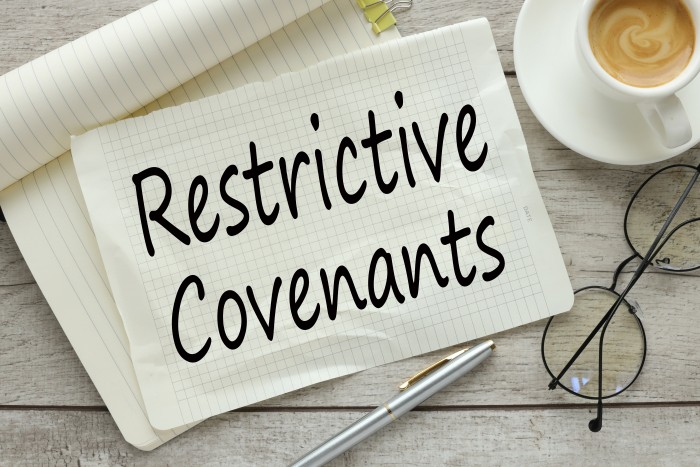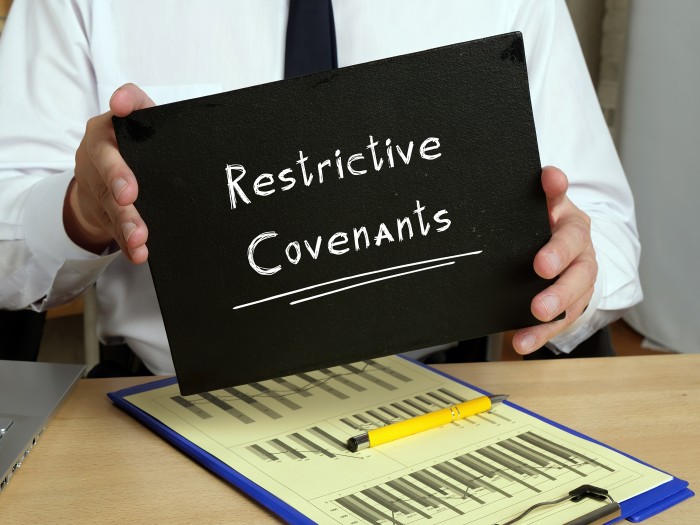
Restrictive Covenants in an Employment Contract
Introduction: What are Restrictive Covenants?
When you think of safeguarding your business, many things come to mind. One critical, yet sometimes overlooked, aspect is the inclusion of restrictive covenants in an employment contract. These covenants are not mere clauses on paper. They act as guardians, protecting your business interests even after an employee exits your company.
At its core, restrictive covenants define boundaries. These boundaries establish what a former employee can and cannot do after leaving their position. For employers, understanding these covenants is fundamental to maintaining the integrity of their business.
Defining Restrictive Covenants
But what exactly do we mean by restrictive covenants? They’re contractual terms agreed upon by both parties. While they take various forms, some common types include:
- Non-compete clauses
- Non-solicitation clauses
- Non-dealing clauses
By incorporating these clauses into an employment contract, employers can mitigate risks. They ensure that their proprietary information, client relationships, and skilled workforce remain intact and free from external threats.
Relevance to Business Owners and Managers
Why should you, as a business owner or manager, care about this? Because in today’s fast-paced business world, competition is fierce. Companies constantly innovate, making it vital to:
- Protect intellectual property
- Preserve client relationships
Restrictive covenants play a pivotal role in achieving these objectives. They fortify your business’s foundation, giving you the peace of mind that departing employees won’t jeopardise your hard-earned position in the market.
Therefore understanding and effectively using restrictive covenants in an employment contract can be the shield your business needs. But remember, it’s not just about having these covenants in place. It’s about crafting them judiciously, ensuring they’re enforceable and fair. And in doing so, you’re not just protecting a business; you’re ensuring its future growth.
Types of Restrictive Covenants in Employment Contracts:
Restrictive covenants in an employment contract serve as protective barriers for businesses. These carefully crafted clauses can mean the difference between retaining your business’s competitive edge and risking valuable assets. Let’s look into the various types of restrictive covenants and their significance for employers.
Non-compete Clauses
The non-compete clause is a robust shield against potential business threats. By integrating this clause, employers ensure:
- Employees refrain from joining competitors post-employment.
- Trade secrets and intellectual property remain confidential.
Non-solicitation and Non-dealing Clauses
Relationships, particularly with clients, are the backbone of any business. To protect these vital ties, employers can lean on two powerful clauses:
- Non-solicitation Clauses: Prohibits former employees from approaching or luring your clients.
- Non-dealing Clauses: Prevents any form of business engagement with certain clients, no matter who initiates the contact.
Both these clauses ensure the relationships you’ve meticulously built over time remain uncompromised.
Non-poaching Clauses
Your workforce is more than just numbers; it’s a repository of skills, experience, and dedication. It’s imperative to shield this asset. The non-poaching clause is a protective measure ensuring former employees can’t entice your current talent pool. It’s a way to preserve the integrity of your team and protect your investment in training and development.
In conclusion, restrictive covenants in an employment contract aren’t just legal jargon. They’re strategic tools, ensuring your business remains resilient, competitive, and thriving, even in the face of potential challenges.
The Legal Perspective: Ensuring Your Covenants are Enforceable
Drafting restrictive covenants in an employment contract is only one side of the coin. The real challenge lies in their enforceability. There are numerous instances where restrictive covenants were rendered void, simply because they overstepped their boundaries. Let’s look at the essentials from a legal standpoint.
‘Reasonableness’ Criterion
The cornerstone of enforceable restrictive covenants is their ‘reasonableness’. But what does ‘reasonable’ really entail?
- Proportional to the interest you’re trying to protect.
- Not overly broad in duration, geography, or scope.
Simply put, while the law acknowledges the necessity of these covenants for businesses, it equally upholds an individual’s right to earn a living.
Striking the Balance
It’s a delicate act, balancing an employer’s need to protect their business with an employee’s career prospects. Here’s what the law focuses on:
- Ensuring covenants don’t overly restrict an employee’s future career opportunities.
- Validating that the clauses genuinely safeguard the employer’s legitimate business interests.
Case Law Insights
Historically, several landmark decisions have shaped how restrictive covenants are viewed. Here are a few pointers to note:
- Each case is distinct; what’s reasonable for one might not be for another.
- Merely copying clauses from other contracts, without tailoring them to specific roles, often leads to unenforceability.
These cases emphasize the importance of precision and relevance in drafting.
In summation, while the inclusion of restrictive covenants in an employment contract is a prudent business move, ensuring their enforceability is equally crucial. The law is not about curtailing business rights but ensuring fairness. With careful drafting and a thorough understanding of the legal landscape, businesses can fortify themselves against potential risks while adhering to the tenets of the law.
Practical Implications for Employers
For employers navigating the intricacies of restrictive covenants in an employment contract, it’s not merely about understanding their legal construct. More importantly, it’s about comprehending their real-world implications. How these covenants play out practically can have significant impacts on both day-to-day operations and long-term business strategies.
Operational Continuity
Operational disruptions can be detrimental. Implementing restrictive covenants, when done correctly, aids in maintaining smooth operations. It provides clarity to current and departing employees regarding their boundaries, minimizing the chances of inadvertent contract breaches.
Preserving Business Reputation
The reputation of a business is often its most invaluable asset. The fallout from a key employee joining a competitor or a former employee soliciting your prime clients can tarnish years of goodwill and trust built in the marketplace. Restrictive covenants act as preventive measures, signalling a clear message to the industry about the seriousness with which you guard your business’s reputation.
- Ensures confidential information stays within closed doors.
- Deters employees from taking strategic leaps to direct competitors.
Recruitment and Training Investments
Consider the time, resources, and finances dedicated to training an employee. It’s not just an investment in that individual but in the future of your business. Restrictive covenants play a pivotal role in safeguarding these investments. It’s about ensuring that the skills, expertise, and knowledge fostered within your company benefit your business, not a competitor’s.
- Minimizes the risk of losing freshly trained talent.
- Optimizes return on training investments.
- Enhances overall workforce stability.
To encapsulate, the practical facets of restrictive covenants in an employment contract span beyond mere legal jargon. They’re intertwined with the very fabric of a business’s operation, growth, and sustainability. As an employer, recognizing these implications allows for more informed decision-making, ensuring that while you protect your business interests, you also foster an environment of trust and clarity with your workforce.
Tips for Drafting Effective Restrictive Covenants in an Employment Contract
When introducing restrictive covenants in an employment contract, meticulous drafting is paramount. A well-crafted covenant can be the shield that guards a company’s vital interests. On the other hand, a poorly written one can be rendered unenforceable, leaving businesses vulnerable. Let’s consider some best practices to keep in mind while drafting these crucial clauses.
Clarity is Key
When defining the terms of your restrictive covenant ambiguity can be a costly misstep:
- Steer clear of jargon.
- Specify clear timelines, geographies, and activities.
This clarity not only aids in enforceability but also ensures that employees understand their obligations fully.
Customise for Each Role
One size rarely fits all in the world of employment contracts. When devising restrictive covenants, consider the nuances of each role. A clause suitable for a senior executive might be excessive for a junior manager. Tailor the covenants based on:
- The access level to sensitive information.
- The employee’s influence over clients and colleagues.
Maintain Proportionality
While it’s tempting to cast a wide net with your covenants, the courts favour proportionality. Ensure your covenants:
- Protect legitimate business interests.
- Don’t overly restrain an employee’s ability to find subsequent employment.
Being fair and balanced not only enhances enforceability but also cultivates trust with employees.
Regularly Review and Update
Business dynamics evolve, and so should your employment contracts. Periodic reviews of restrictive covenants in an employment contract ensure they remain relevant and enforceable. This adaptability reflects the evolving nature of business roles, relationships, and risks.
In essence, drafting an effective restrictive covenant demands a blend of precision, fairness, and foresight. By heeding these tips and maintaining a finger on the pulse of legal and industry shifts, businesses can craft covenants that stand the test of time and litigation.
Challenging and Enforcing Restrictive Covenants in an Employment Contract
It’s one thing to draft restrictive covenants in an employment contract, but the true litmus test comes when these covenants face challenges or require enforcement. Navigating this process can be complex and the outcome can significantly influence a business’s trajectory.
The Grounds for Challenge
Often, employees may contest a restrictive covenant on the premise that it is overly restrictive and hinders their right to earn a livelihood. They might argue that the covenant is broader than necessary to protect the employer’s legitimate business interests. Moreover, any ambiguity in the contract language can also provide grounds for challenge. Therefore, ensuring clarity, reasonableness, and precision during the drafting stage is of utmost importance.
Enforcement Mechanisms
Should an ex-employee breach the terms, enforcing a restrictive covenant is the next logical step. The primary tool for employers in such situations is to seek an injunction, a court order that prevents the former employee from continuing their breaching activities. This can be particularly effective if the employee has joined a competitor or is using confidential information to the detriment of the previous employer. Additionally, employers might pursue damages for any financial loss resulting from the breach.
Ensuring Successful Enforcement
Success in enforcing restrictive covenants in an employment contract hinges on several factors. Demonstrating that the covenant is reasonable and crucial for protecting legitimate business interests is fundamental. Next, tangible evidence of the breach, like correspondence or testimonies, can bolster the case. Documentation showing the potential or actual harm caused to the business due to the breach can also play a pivotal role. Given these factors, businesses must maintain meticulous records and act promptly when a breach is detected.
Potential Pitfalls
Enforcement isn’t without its challenges. Besides the obvious legal costs, a protracted legal battle can result in unwanted public scrutiny, potentially impacting business reputation. There’s also the risk of the court ruling against the enforceability of the covenant. This not only weakens the employer’s position but might also set a precedent for future contractual disputes.
In conclusion, while restrictive covenants in an employment contract are valuable tools in an employer’s arsenal, they demand a strategic approach in both drafting and enforcement. A well-balanced blend of proactiveness, sound legal counsel, and business acumen can navigate the intricacies of challenging and enforcing these pivotal clauses.
Call John Bloor at EBS Law on 01625 87 4400 if you are an employer and need free Employment Law Advice.


